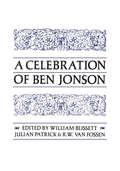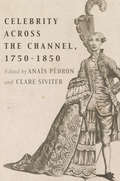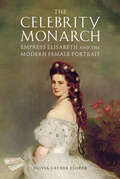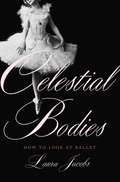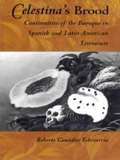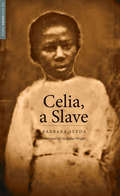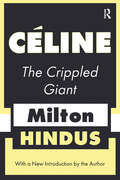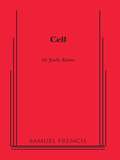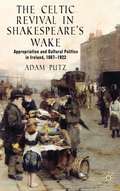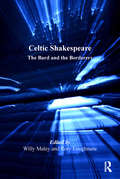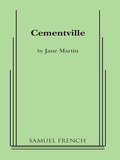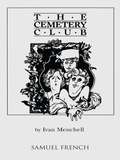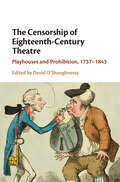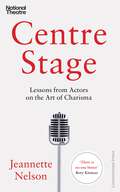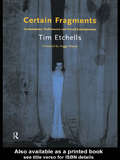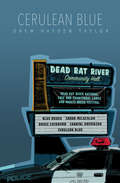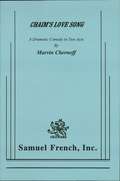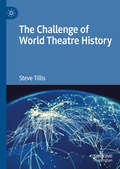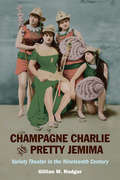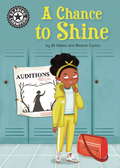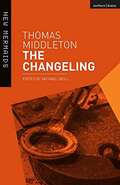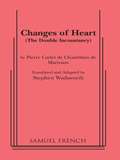- Table View
- List View
Celebrating Shakespeare
by Calvo, Clara and Kahn, Coppélia Clara Calvo Coppélia KahnOn the 400th anniversary of Shakespeare's death, this collection opens up the social practices of commemoration to new research and analysis. An international team of leading scholars explores a broad spectrum of celebrations, showing how key events - such as the Easter Rising in Ireland, the Second Vatican Council of 1964 and the Great Exhibition of 1851 - drew on Shakespeare to express political agendas. In the USA, commemoration in 1864 counted on him to symbolise unity transcending the Civil War, while the First World War pulled the 1916 anniversary celebration into the war effort, enlisting Shakespeare as patriotic poet. The essays also consider how the dream of Shakespeare as a rural poet took shape in gardens, how cartoons challenged the poet's élite status and how statues of him mutated into advertisements for gin and Disney cartoons. Richly varied illustrations supplement these case studies of the diverse, complex and contradictory aims of memorialising Shakespeare.
A Celebration of Ben Jonson
by William F. Blissett Julian Patrick R.W. Van FossenThe papers in this volume were given by some of the world's foremost Jonsonian scholars at a conference at the University of Toronto which marked the 400th anniversary of his birth. Each contributor came from a different institution, and Canada, the United States, Great Britain, and New Zealand were represented. The balance of papers likewise reflects the range of Ben Jonson's achievement and the combination of brio and control so characteristic of him.The papers arrange themselves in pairs: 'The Incredibility of Jonsonian Comedy,' as discussed by Professor Clifford Leech, is of a piece with distrust and defiance of the audience as discussed in the paper 'Jonson and the Loathèd Stage' by Professor Jonas Barish; Professor George Hibbard in 'Ben Jonson and Human Nature' and Professor D.I. McKenzie in 'The Staple of News and the Late Plays' offer critical assessment of plays, the one wide-ranging, the other closely focused on a previously neglected play; and Professor H.N. Maclean in '"A More Secret Cause": The Wit of Jonson's Poetry' and Professor L.C. Knights in 'Ben Jonson: Public Attitudes and Social Poetry' approach the difficult and rewarding task of defining Jonson's poetry of appraisal in different but complementary styles.
Celebrity Across the Channel, 1750–1850 (Performing Celebrity)
by Ariane Fichtl Chris Haffenden Emrys Jones Miranda Kiek Antoine Lilti Margaret Mason Anaïs Pédron Laure Philip Anna Senkiw Clare Siviter Blake Smith Gabriel WickCelebrity Across the Channel, 1750-1850 is the first book to study and compare the concept of celebrity in France and Britain from 1750 to 1850, offering a transnational perspective. It places in dialogue the growing field of celebrity studies in the two countries, especially by engaging with Antoine Lilti’s seminal work, The Invention of Celebrity, translated into English in 2017. With contributions from a diverse range of fields, such as history, politics, literature, theater studies, and musicology, the volume employs a firmly interdisciplinary scope to explore an era marked by social, political, and cultural upheaval. The organization of the collection allows for new readings of the similarities and differences in the understanding of celebrity in Britain and France. Consequently, the volume builds upon questions that are currently at the heart of celebrity studies.
The Celebrity Monarch: Empress Elisabeth and the Modern Female Portrait (Performing Celebrity)
by Olivia Gruber FlorekEmpress Elisabeth of Austria (1837-1898), wife of Habsburg Emperor Francis Joseph I, was celebrated as the most beautiful woman in Europe. Glamorous painted portraits by Franz Xaver Winterhalter and widely collected photographs spread news of her beauty, and the twentieth-century German-language film trilogy Sissi (1955-57) cemented this legacy. Despite the enduring fascination with the empress, art historians have never considered Elisabeth’s role in producing her public portraiture or the influence of her creation. The Celebrity Monarch reveals how portraits of Elisabeth transformed monarchs from divinely appointed sovereigns to public personalities whose daily lives were consumed by spectators. With resources ranging from the paintings of Gustav Klimt and Elisabeth’s private collection of celebrity photography to twenty-first century collages and films by T. J. Wilcox, this book positions Elisabeth herself as the primary engineer of her public image and argues for the widespread influence of her construction on both modern art and the emerging phenomenon of celebrity.
Celebrity, Performance, Reception
by David WorrallBy 1800 London had as many theatre seats for sale as the city's population. This was the start of the capital's rise as a centre for performing arts. Bringing to life a period of extraordinary theatrical vitality, David Worrall re-examines the beginnings of celebrity culture amidst a monopolistic commercial theatrical marketplace. The book presents an innovative transposition of social assemblage theory into performance history. It argues that the cultural meaning of drama changes with every change in the performance location. This theoretical model is applied to a wide range of archival materials including censor's manuscripts, theatre ledger books, performance schedules, unfamiliar play texts and rare printed sources. By examining prompters' records, box office receipts and benefit night takings, the study questions the status of David Garrick, Sarah Siddons and Edmund Kean, and recovers the neglected actress, Elizabeth Younge, and her importance to Edmund Burke.
Celestial Bodies: How to Look at Ballet
by Laura JacobsA distinguished dance critic offers an enchanting introduction to the art of balletAs much as we may enjoy Swan Lake or The Nutcracker, for many of us ballet is a foreign language. It communicates through movement, not words, and its history lies almost entirely abroad--in Russia, Italy, and France. In Celestial Bodies, dance critic Laura Jacobs makes the foreign familiar, providing a lively, poetic, and uniquely accessible introduction to the world of classical dance. Combining history, interviews with dancers, technical definitions, descriptions of performances, and personal stories, Jacobs offers an intimate and passionate guide to watching ballet and understanding the central elements of choreography.Beautifully written and elegantly illustrated with original drawings, Celestial Bodies is essential reading for all lovers of this magnificent art form.
Celestina’s Brood: Continuities of the Baroque in Spanish and Latin American Literature
by Roberto González EchevarríaPublished in 1499 and centered on the figure of a bawd and witch, Fernando de Rojas' dark and disturbing Celestina was destined to become the most suppressed classic in Spanish literary history. Routinely ignored in Spanish letters, the book nonetheless echoes through contemporary Spanish and Latin American literature. This is the phenomenon that Celestina's Brood explores.Roberto González Echevarría, one of the most eminent and influential critics of Hispanic literature writing today, uses Rojas' text as his starting point to offer an exploration of modernity in the Hispanic literary tradition, and of the Baroque as an expression of the modern. His analysis of Celestina reveals the relentless probing of the limits of language and morality that mark the work as the beginning of literary modernity in Spanish, and the start of a tradition distinguished by a penchant for the excesses of the Baroque. González Echevarría pursues this tradition and its meaning through the works of major figures such as Cervantes, Lope de Vega, Calderón de la Barca, Alejo Carpentier, Carlos Fuentes, Gabriel García Márquez, Nicolás Guillén, and Severo Sarduy, as well as through the works of lesser-known authors.By revealing continuities of the Baroque, Celestina's Brood cuts across conventional distinctions between Spanish and Latin American literary traditions to show their profound and previously unimagined affinity.
Celia, a Slave
by Nicholas Wright Barbara SeydaThe ninth winner of the Yale Drama Series is a searing and powerful drama of slave litigation, injustice, institutional racism, and the rule of law. The winner of the 2015 Yale Drama Series playwriting competition was selected by Nicholas Wright, former Associate Director of London's Royal Court. Barbara Seyda's stunningly theatrical Celia, a Slave is a vivid tableau of interviews with the dead that interweaves oral histories with official archival records. Powerful, poetic, and stylistically bold, this work foregrounds twenty-three diverse characters to recall the events that led to the hanging of nineteen-year-old Celia, an African American slave convicted in a Missouri court of murdering her master, the prosperous landowner Robert Newsom, in 1855. Excavating actual trial transcripts and court records, Seyda bears witness to racial and sexual violence in U. S. history, illuminating the brutal realities of female slave life in the pre-Civil War South while exploring the intersection of rape, morality, economics, and gender politics that continue to resonate today.
Celine the Crippled Giant: Reading The Maternal Imaginary
by Milton HindusLouis Ferdinand Céline (the pseudonym of Louis Destouches) was a famous novelist and ferocious anti-Semitic pamphleteer who rose to fame before Hitler, but perfectly represented the fascist mind-set that swept across Europe between 1932 and 1944. Never a Nazi himself, he was author of Journey to the End of the Night, Death on the Installment Plan, Guignol's Band, Homage to Zola, and a series of "pamphlets." The latter are a potpourri of racist editorials, ballet scenarios, and anti-Semitic confessions so violent that an aesthete like Andre Gide thought them parodies of other anti-Semitic literature. Little wonder the Nazis regarded Céline as a fellow-traveler. He retreated with the Nazis across the Rhine and sought refuge with them, first in Germany and then in Denmark. In 1951, he benefitted from an amnesty as a wounded veteran of both World Wars. Before his death in 1961 he had regained his popularity with the public and was regarded as a classic writer. Now that the body of his work is in translation, Céline's fame in the literary world circles the globe.Céline, perhaps more than any other analysis, helps shed some light on this enigmatic figure. It establishes his literary importance, and, at the same time, examines his anti-Semitism. After a final meeting, Hindus declared that "Celine is a splinter in my mind that I've got either to absorb completely or eject completely." The reader of this fascinating critical memoir of one of the twentieth century's most controversial literary figures is apt to be left with a similar dilemma.
Cell
by Judy KlassCell is a murder mystery - to about the same extent that Sophocles’ Oedipus Rex is a murder mystery. Lieutenant Rodriguez questions Dennis Kadman about his older brother Michael, who has OD’d on heroin in Dennis’ apartment. Dennis wants to know: who gave Michael the drugs? Michael was a cunning, manipulative addict. But he was placed in his brother’s care by the courts – and Dennis tried to keep him alive and drug-free. Through flashbacks, we see the fractious relationship between the brothers, and how they interacted with other “suspects,” including Edith, the Jamaican nurse who believed Michael should be allowed to choose to die; Julie, Dennis’ fiancée who hated what Michael was doing to Dennis and to their relationship; and Byron, Michael’s homeless friend with whom he had lived on the streets. Like Oedipus, while looking for the culprit, Dennis learns far too much about himself.
The Celtic Revival in Shakespeare’s Wake
by Adam PutzThis book reconsiders the Celtic Revival by examining appropriations of Shakespeare, using close readings of works by Arnold, Dowden, Yeats and Joyce to reveal the pernicious manner in which the discourse of Anglo-Irish cultural politics informed the critical paradigms that mediated the reading of Shakespeare in Ireland for a generation.
Celtic Shakespeare: The Bard and the Borderers
by Rory LoughnaneDrawing together some of the leading academics in the field of Shakespeare studies, this volume examines the commonalities and differences in addressing a notionally 'Celtic' Shakespeare. Celtic contexts have been established for many of Shakespeare's plays, and there has been interest too in the ways in which Irish, Scottish and Welsh critics, editors and translators have reimagined Shakespeare, claiming, connecting with and correcting him. This collection fills a major gap in literary criticism by bringing together the best scholarship on the individual nations of Ireland, Scotland and Wales in a way that emphasizes cultural crossovers and crucibles of conflict. The volume is divided into three chronologically ordered sections: Tudor Reflections, Stuart Revisions and Celtic Afterlives. This division of essays directs attention to Shakespeare's transformed treatment of national identity in plays written respectively in the reigns of Elizabeth and James, but also takes account of later regional receptions and the cultural impact of the playwright's dramatic works. The first two sections contain fresh readings of a number of the individual plays, and pay particular attention to the ways in which Shakespeare attends to contemporary understandings of national identity in the light of recent history. Juxtaposing this material with subsequent critical receptions of Shakespeare's works, from Milton to Shaw, this volume addresses a significant critical lacuna in Shakespearean criticism. Rather than reading these plays from a solitary national perspective, the essays in this volume cohere in a wide-ranging treatment of Shakespeare's direct and oblique references to the archipelago, and the problematic issue of national identity.
Cementville
by Jane MartinComedy / 5m, 9f / Interior / The comic sensation of the 1991 Humana Festival at the Actors Theatre of Louisville, this play by the author of Talking With and numerous hits is a brilliant portrayal of America's fascination with fantasy entertainment. In a locker room in a seedy arena in Tennessee, the scurvy bunch of professional lady wrestlers includes Tiger who has a drinking problem and a small dog; Dani who displays a chip on her shoulder against the promoter who owes the girls several weeks' pay; Lessa, an Olympic shot putter with delusions of being a pro athlete and Netty, an overweight older woman who appears in the ring as "Pajama Mama." The eager beaver go fer Nola and the Knockout Sisters, refugees from the Big Time banned for drug and other abuses, complete the roster for tonight's main attraction. Sparks fly when the other women find out about them.
The Cemetery Club
by Ivan MenchellIvan MenchellComedyCharacters: 1 male, 5 femaleMultiple SetsThree Jewish widows meet once a month for tea before going to visit their husband's graves. Ida is sweet tempered and ready to begin a new life, Lucille is a feisty embodiment of the girl who just wants to have fun, and Doris is priggish and judgmental, particularly when Sam the butcher enters the scene. He meets the widows while visiting his wife's grave. Doris and Lucille squash the budding romance between Sam and Ida. They are guilt stricken when this nearly breaks Ida's heart. The Broadway production starred Eileen Heckart as Lucille."Funny, sweet tempered, moving." -Boston Globe"Very touching and humorous. An evening of pure pleasure that will make you glad you went to the theatre."-Washington Journal Newspapers
The Censorship of Eighteenth-Century Theatre: Playhouses and Prohibition, 1737–1843
by David O’ShaughnessyThis collection reveals the wide-ranging impact of the Stage Licensing Act of 1737 on literary and theatrical culture in Georgian Britain. Demonstrating the differing motivations of the state in censoring public performances of plays after the Stage Licensing Act of 1737 and until the Theatres Act 1843, chapters cover a wide variety of theatrical genres across a century and show how the mechanisms of formal censorship operated under the Lord Chamberlain's Examiner of Plays. They also explore the effects of informal censorship, whereby playwrights, audiences and managers internalized the censorship regime. As such, the volume moves beyond a narrow focus on erasures and emendations visible on manuscripts to elucidate censorship's wide-ranging significance across the long eighteenth century. Demonstrating theatre archives' potency as a resource for historical research, this volume is of exceptional value for researchers interested in the evolving complexities of Georgian society, its politics and mores.
Centre Stage: Lessons from Actors on the Art of Charisma
by Jeannette NelsonHow the world’s best actors communicate with gravitas – and how you can, too.‘The theatre stars’ voice guru’ Daily MailActing is all about charisma. Whether you’re an A-list star or an extra, when you’re on stage you need to perform in a way that makes your audience listen.That stage presence is something we can all learn from. Every time you speak up in a meeting, recount an anecdote, or tell a joke, it’s essential to communicate with gravitas.Jeannette Nelson knows a thing or two about gravitas. As Head of Voice at the National Theatre, she has spent three decades working with the world’s leading actors – from Al Pacino to Benedict Cumberbatch to Juliette Binoche – teaching them to speak clearly and move confidently.Now, Nelson pulls back the curtain on the tricks that professional performers use to own the room. Starting with clear speech and good posture, before moving on to the art of rhetoric and overcoming stage fright, she outlines a holistic three-stage method to communicating with authority, authenticity and eloquence. Throughout, she peppers the book with stories of how world-renowned actors learnt to make themselves heard – and how you can, too.The result is a fascinating and eminently practical guide to the art of performance. If all the world’s a stage, then this book will turn you into its lead actor.
Certain Fragments: Texts and Writings on Performance
by Tim EtchellsWhat is the relationship between performance and play? Between performance and technology? Between performance and death? Certain Fragments is an extraordinary exploration of what lies at the heart of contemporary theatre. Written by the artistic director of Forced Entertainment, acknowledged to be Britains most brilliant experimental theatre company (Guardian), Certain Fragments investigates the processes of devising performance, the role of writing in an interdisciplinary theatre, and the influence of the city on contemporary art practice. Tim Etchells unique and provocative voice shifts from intimate anecdote to critical analysis and back again. And as in his theatre-making so in his book: with Certain Fragments Etchells disrupts traditional notions of creative, academic, and intellectual work. The book is an exciting and radical fusion of story-telling and criticism. It also makes available, for the first time, four seminal Forced Entertainment texts by Etchells.
Cerulean Blue
by Drew Hayden TaylorCerulean Blue is a comedic play about a struggling blues band invited to participate in a benefit concert for a First Nation community in conflict with governmental authorities. Upon arriving, the band discovers the entire lineup of musical acts has cancelled and they're left trapped behind barricades. Complicating the matter, there is conflict within the band and the sudden appearance of an old girlfriend makes the event even more perilous. This play is an homage to fast-moving farces while also addressing Aboriginal issues. Cerulean Blue deals with relationships, perceptions, politics, and what to do when you discover you've been dating your first cousin. Add a few spoonfuls of original blues music, and you've got a fun-filled evening. The play was written for a large ensemble cast, which makes it ideal for musical theatre departments in high schools and colleges - every student can play a part. An original musical score by Andrew Clemens will be available for download from Talonbooks.com. Cast of ten women and ten men.
Cet instant où, soudainement, tu ressens le bonheur
by Hitomi IidaUne longue lettre d'amour à mon âme sœur qui me regarde avec nostalgie par-delà le temps et l’espace
Chaim's Love Song
by Marvin ChernoffDramatic comedy / 3m, 4f / Unit set / Chaim Shotsky, a retired mailman in Brooklyn, is an American Tevye who tells his life story to Kelly Burke from Iowa. His exotic tale is rich with vitality. His friends include a philosophical baker, a Holocaust survivor with many secrets, his son and daughter, a matchmaker to end all matchmakers, movie star pigeons and a host of Israelis. Chaim's story, a love song for life, is one of innocence, tragedy, struggle, humor, humanity and ultimately triumph.
The Challenge of World Theatre History
by Steve TillisThe future of theatre history studies requires consideration of theatre as a global phenomenon. The Challenge of World Theatre History offers the first full-scale argument for abandoning an obsolete and parochial Eurocentric approach to theatre history in favor of a more global perspective. This book exposes the fallacies that reinforce the conventional approach and defends the global perspective against possible objections. It moves beyond the conventional nation-based geography of theatre in favor of a regional geography and develops a new way to demarcate the periods of theatre history. Finally, the book outlines a history that recognizes the often-connected developments in theatre across Eurasia and around the world. It makes the case that world theatre history is necessary not only for itself, but for the powerful comparative and contextual insights it offers to all theatre scholars and students, whatever their special areas of interest.
Champagne Charlie and Pretty Jemima: Variety Theater in the Nineteenth Century (Music in American Life #441)
by Gillian M RodgerIn this rich, imaginative survey of variety musical theater, Gillian M. Rodger masterfully chronicles the social history and class dynamics of the robust, nineteenth-century American theatrical phenomenon that gave way to twentieth-century entertainment forms such as vaudeville and comedy on radio and television. Fresh, bawdy, and unabashedly aimed at the working class, variety honed in on its audience's fascinations, emerging in the 1840s as a vehicle to accentuate class divisions and stoke curiosity about gender and sexuality. Cross-dressing acts were a regular feature of these entertainments, and Rodger profiles key male impersonators Annie Hindle and Ella Wesner while examining how both gender and sexuality gave shape to variety. By the last two decades of the nineteenth century, variety theater developed into a platform for ideas about race and whiteness. As some in the working class moved up into the middling classes, they took their affinity for variety with them, transforming and broadening middle-class values. Champagne Charlie and Pretty Jemima places the saloon keepers, managers, male impersonators, minstrels, acrobats, singers, and dancers of the variety era within economic and social contexts by examining the business models of variety shows and their primarily white, working-class urban audiences. Rodger traces the transformation of variety from sexualized entertainment to more family-friendly fare, a domestication that mirrored efforts to regulate the industry, as well as the adoption of aspects of middle-class culture and values by the shows' performers, managers, and consumers.
A Chance to Shine: Independent Reading 18 (Reading Champion #457)
by Jill AtkinsLily hates her athletics training but wants to please her parents, though she'll never be as good as her brother, Abe. One day she spots an audition poster at school and discovers her chance to shine lies on the stage, not on the athletics track ... This first colour chapter book is a perfectly levelled, accessible text for Key stage 2 readers aged 10-11 or in year 6. Reading Champion offers independent reading books for children to practise and reinforce their developing reading skills.Fantastic, original stories are accompanied by engaging artwork and activities to provoke deeper response and encourage writing. Each book has been carefully graded so that it can be matched to a child's reading ability, encouraging reading for pleasure.The Key Stage 2 Reading Champion Books are suggested for use as follows:Independent Reading 11: start of Year 3 or age 7+Independent Reading 12: end of Year 3 or age 7+Independent Reading 13: start of Year 4 or age 8+Independent Reading 14: end of Year 4 or age 8+Independent Reading 15: start of Year 5 or age 9+Independent Reading 16: end of Year 5 or age 9+Independent Reading 17: start of Year 6 or age 10+Independent Reading 18: end of Year 6 or age 10+
The Changeling: Revised Edition (New Mermaids)
by Thomas Middleton William Rowley Michael Neill“The next good mood I find my father in, I'll get him quite discarded” <p><p> With these chillingly offhand words, Beatrice-Joanna, the spoilt daughter of a powerful nobleman, plots to get rid of the family servant who has crossed her once too often. The Changeling's vivid tale of sexual appetite, repulsion, betrayal and lunacy remains one of the most compelling tragedies of the 17th century. Exposing the vexed relationship between servants and masters, setting notions of `change' against the revelation of psychological 'secrets' as ways of explaining human behaviour, and exploring the idea of love as a `tame madness', the play reveals the terrifying consequences of ungoverned sexual appetite and betrayal. Featuring the full and modernized play text, this revised edition includes incisive commentary notes which explain the nuances of the play's vibrant, colloquial language and demonstrate its sly delight in the characters' conscious and unconscious wordplay. Michael Neill's illuminating introduction provides a firm grounding in the play's socio-political context, demonstrates how careful close-reading can expand your enjoyment of the play, explains the play's violent linkage of comic and tragic plots and gives theatrical life to the text via a discussion of its stage history, with a particular emphasis on the most interesting recent productions. <p><p> The New Mermaids plays offer: · Modernized versions of the play text edited to the highest textual standards · Fully annotated student editions with obscure words explained and critical, contextual and staging insight provided on each page · Full Introductions analyzing context, themes, author background and stage history
Changes Of Heart
by MariveauxMarivaux's fabulous Harlequin pursues his country love Silvia to the palace, where the lovelorn Prince holds her against her will. Flaminia, an intriguer at court, attempts to reroute the affections of both Silvia and Harlequin, whose take no prisoners belligerence is softened and transformed. None expect such huge and costly changes of heart and, at the end of a hilarious day full of wonderment, they and others at court are wounded and ennobled by love.

